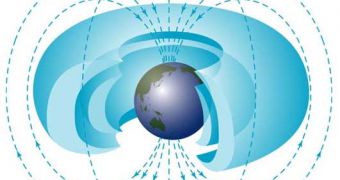The Van Allen radiation belt consists of two concentric zones inside of which charged subatomic particles are being trapped by Earth's geomagnetic field. The outer belt is able to capture particles from the solar wind and retain them for as long as a week, while the inner belt could keep particles trapped inside it for up to a year, thus leading to potentially dangerous buildups in the outcome of solar storms or other nuclear activities outside Earth's atmosphere.
Usually, the satellites orbiting around the planet in the Van Allen zone are mostly subjected to damage related to the buildup of charged subatomic particles, but new observations reveal that particles in the Van Allen Radiation belt can be released back into space with the help of Very Low Frequency radio waves. A satellite equipped with such a transmitter could clear the Van Allen Radiation belts of any particle accumulation, thus protecting the other satellites placed on similar orbits.
The effect had been previously theoretically predicted and VLF radio waves - with frequencies between 5 to 25 kilohertz - showed some interactions in the inner radiation belt, albeit it was only recently confirmed during ground based and space observations. "It was very hard to nail down", says Craig Rodger from the University of Otago.
VLF radio waves are able to penetrate more of Earth's atmosphere during nighttime. While a powerful transmitter in Australia was turned off and on, a satellite called DEMETER was used to measure electrons in the vicinity of the inner belt. Although the US Air Force already had in plan to use the same effect to protect its precious spy satellites with VLF radio waves of 20 kilohertz, this was the first time when the concept was in fact demonstrated and the Van Allen belts were observed in their 'natural' state.
"Electron lifetime in the belts now must be different than it was before the transmitters were built, but we don't know how different", Rodger said.

 14 DAY TRIAL //
14 DAY TRIAL //